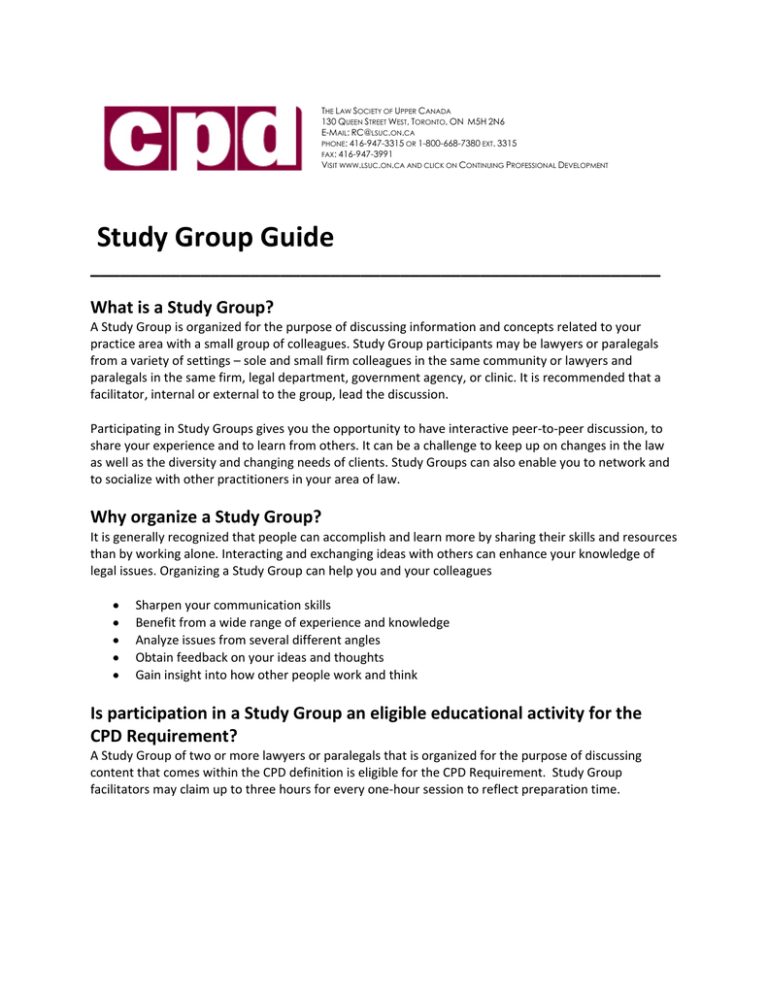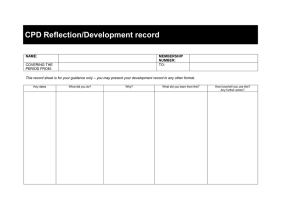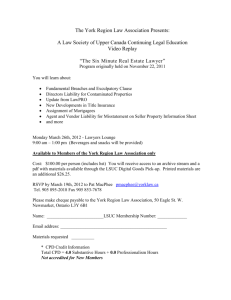Study Group Guide - The Law Society of Upper Canada
advertisement

THE LAW SOCIETY OF UPPER CANADA 130 QUEEN STREET WEST, TORONTO, ON M5H 2N6 E-MAIL: RC@LSUC.ON.CA PHONE: 416-947-3315 OR 1-800-668-7380 EXT. 3315 FAX: 416-947-3991 VISIT WWW.LSUC.ON.CA AND CLICK ON CONTINUING PROFESSIONAL DEVELOPMENT Study Group Guide _________________________________________________________ What is a Study Group? A Study Group is organized for the purpose of discussing information and concepts related to your practice area with a small group of colleagues. Study Group participants may be lawyers or paralegals from a variety of settings – sole and small firm colleagues in the same community or lawyers and paralegals in the same firm, legal department, government agency, or clinic. It is recommended that a facilitator, internal or external to the group, lead the discussion. Participating in Study Groups gives you the opportunity to have interactive peer-to-peer discussion, to share your experience and to learn from others. It can be a challenge to keep up on changes in the law as well as the diversity and changing needs of clients. Study Groups can also enable you to network and to socialize with other practitioners in your area of law. Why organize a Study Group? It is generally recognized that people can accomplish and learn more by sharing their skills and resources than by working alone. Interacting and exchanging ideas with others can enhance your knowledge of legal issues. Organizing a Study Group can help you and your colleagues Sharpen your communication skills Benefit from a wide range of experience and knowledge Analyze issues from several different angles Obtain feedback on your ideas and thoughts Gain insight into how other people work and think Is participation in a Study Group an eligible educational activity for the CPD Requirement? A Study Group of two or more lawyers or paralegals that is organized for the purpose of discussing content that comes within the CPD definition is eligible for the CPD Requirement. Study Group facilitators may claim up to three hours for every one-hour session to reflect preparation time. Can participation in a Study Group be considered an eligible educational activity for the three-hour professionalism content requirement? Study Groups may wish to include content on professional responsibility, ethics and practice management to help participants meet the CPD professionalism requirement of three hours. In order for Study Group participants to claim credit for the professionalism requirement, the content discussed must be accredited in advance by the Law Society of Upper Canada. You will need to complete an Application for Accreditation of Alternate Eligible Educational Activities (PDF) a minimum of 30 days in advance of the Study Group date. See the Law Society’s CPD Accreditation Process for more information. Consider using one or more of the Law Society’s Professionalism Case Studies during your session to obtain the professionalism credit. Case studies are based on actual situations in which a lawyer or paralegal was faced with a decision involving one or more ethical, professional responsibility, or practice management issues. Who should participate in the Study Group? Study Groups work best when there are four or five members per facilitator. It is recommended that participants are from the same geographical area, are at the same level of experience and practise in the same area of law. Cooperation among group members and a willingness to be an active group participant are required in order for the Study Group to be successful. Your local law association can assist you in contacting colleagues in your practice area. Advertisements for your Study Group can be posted electronically or at your local law library. Who should facilitate the Study Group? You will need to choose a facilitator for each of your topics. The facilitator, internal or external to your group, takes the role of the session leader to keep the discussion on track and productive. Facilitators are responsible for Introducing the topic Creating an open forum for discussion Leading and encouraging discussion Asking open-ended questions to stimulate thought Making sure everyone has an opportunity to participate Reinforcing and clarifying the content What should be discussed at the Study Group? Limit your topics to two per hour. This allows time for introduction of the topic, a 25-minute discussion and a wrap-up of each issue. You can find discussion points for your Study Group by Asking other lawyers in your area of law for topics Reviewing the Law Society’s Professionalism Case Studies Monitoring online blogs dedicated to your practice area Reviewing legal newspapers, magazines and law journals 2 of 3 Looking at CPD calendars for upcoming programs in your area of law and reviewing the topics listed in the program agendas Checking law or paralegal association websites What makes a Study Group successful? Each member of the Study Group contributes to the discussion Only one member of the Group speaks at a time and the others actively listen Members are prompt and come prepared The Study Group stays on topic Members are free to ask questions and provide constructive criticism Where and when should the Study Group take place? You should select a meeting place that is free from distractions. The Group could meet in a boardroom, restaurant, courthouse or law library. Study Groups work best in a relaxed environment where participants meet face-to-face to talk about the issues. Consider scheduling your Study Group over lunch, after work or at a dinner meeting. How long should the Study Group be? It is recommended that your Study Group be one or two hours in length, depending on the number of topics to be discussed. No more than two topics should be scheduled per hour. It is important to honour the ending time. Follow-up? Take a few minutes at the end of the Study Group to review what has been discussed. Exchange contact information and consider staying in touch with the fellow participants. Study group participants can be a source of support and encouragement. Some participants may wish to set up the next Study Group meeting at this time. Other resources are available for those who wish to facilitate a Study Group. Please contact us at RC@lsuc.on.ca. 3 of 3



